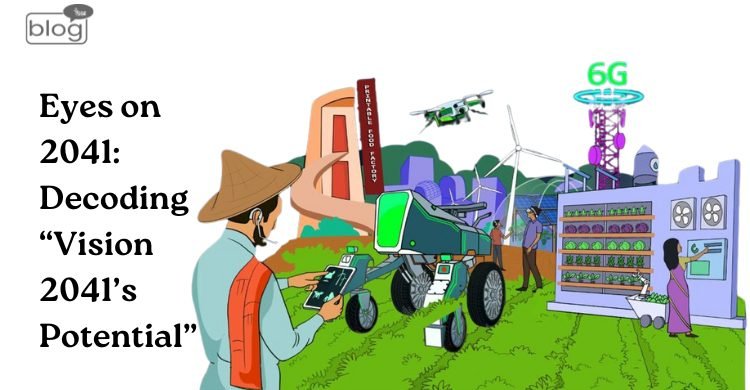Buckle up everyone for the journey into the future unimaginable web of creativity, cooperation, and social transformation awaits us in “Vision 2041”.
With its rich history and vibrant culture, Bangladesh and its government are pursuing the “Smart Bangladesh Vision 2041.”
This ambitious vision aims to make the nation an environment-friendly and technical leader by 2041.
Smart Bangladesh was announced on December 12, 2022, and will begin on December 16, 2041. The “Smart Bangladesh” age has begun.
What is “Smart Bangladesh Vision 2041” and its future? Let’s explore its potential:
Smart Citizens & Smart Government:-
The Fourth Industrial Revolution has both opportunities and difficulties for Bangladesh. Artificial intelligence, robots, and the renewable economy offer revolutionary potential, thus the government of the nation has adopted “Smart Citizens and Smart Governments”.
The middle of this program is “MyGov,” a new way for citizens to use digital services.
“MyGov” centralizes digital services from multiple ministries under one app. MyGov offers a comfortable design and incorporates auxiliary services like online payments to make the user experience seamless.
Service applications, delivery status, and payments are now available in one spot. The software includes the National Service connection Helpline, ‘333’, for users without an internet connection.
The Cabinet Division and the Access to Information (a2i) program have set out on a strategic mission to turn the obstacles presented by the Fourth Industrial Revolution (4IR) into possibilities.
The Innovation Lab (iLab) of a2i will be leading the creation and sale of homegrown tools and solutions going ahead.
Smart Economy & Smart Society:-
Bangladesh is transforming its socioeconomic environment towards a Smart Economy and Smart Society by 2041.
This blog discusses ekShop and a2i’s iLab, two breakthrough Bangladeshi and UNDP programs that are part of the wider vision for a wiser, more inclusive nation.
Millions of Bangladeshi rural youth, workers, and farmers have struggled to sell their goods at acceptable prices.
In response, a2i, the flagship innovation and digital transformation program, and UNDP created ekShop. This innovative supported rural eCommerce approach uses over 7,000 Digital Centres’ physical network.
ekShop has powered approximately one million entrepreneurs and 5 million transactions worth $10 million with 16 local and 4 multinational e-commerce companies.
Digital livelihoods for Syrian refugees in Turkey are being considered, along with replicating the ekShop model in Colombia, Uganda, Jordan, and others.
Smart Agriculture:-
In Bangladesh, where geographical limits meet population growth, agriculture is the key to success. The 8th highest population and population density exceeding 1,300 per km2 require creative agricultural methods.
Agriculture, which accounts for 14% of the country’s GDP, has reduced poverty, ensured food security, and supported 41% of the workforce.
Smart agriculture is much needed. Bangladesh needs cutting-edge technology and data-driven policies to continue progress and overcome climate change.
Smart Agriculture requires finance, weather and soil data, market intelligence, and data-driven decision-making.
According to a2i’s Bangladesh experience, Smart Agriculture’s financial sustainability may be achieved in three stages:
- First-stage funding requires the government, large input suppliers, and IT businesses to work together. Innovative service finance will depend on public-private collaborations.
- In the second step, thousands more farmers’ cooperatives will contribute financially to access these new services.
- In the third stage, millions of farmers will adopt Smart Agriculture services. As microservices are affordable to small-scale farmers, these services will help continue the program.
Besides all of that, resources and technologies for smart agriculture:
IoT-based smart meter/switch for irrigation pumps, IoT-based Decision-making of Irrigation and Fertilizer Management, Krishoker Janala v.2, IoT-based Smart Fish Farm, Automation of the Dairy Industry, E-traceability of ruminants for livestock management, Food Supply Chain Processing, E-traceability for Agriculture management.
Smart Health:-
Child mortality, maternal health, and illness prevention have all seen significant improvements in Bangladesh throughout the past few decades.
Many locals are unable to afford universal health care due to high private-sector prices and out-of-pocket expenses, even if these changes have occurred.
In this context, digital healthcare has the potential to be more inclusive and successful.
An all-inclusive digital health ecosystem is being driven by a2i’s Smart Health Accelerator in Bangladesh.
Healthcare is improved and challenges are overcome through digitization.
The core objectives include managing health information, digitizing patient data, enhancing pediatric and prenatal care, primary healthcare service strengthening, health literacy improvement, telemedicine promotion, and the treatment of diseases that are not transmissible.
To aid with healthcare, relief efforts, and decision-making, A2i and the Cabinet Division developed the National COVID-19 Dashboard.
The Ministry of Health and Police Administration can better distribute aid, and lockdown areas, and identify high-risk areas with the use of this program.
Finally, “Smart Bangladesh Vision 2041″ might spark a technological and economic golden age. Bangladesh wants a smart, inclusive, and sustainable future through digital transformation, innovation, sustainability, education, and smart infrastructure.
Bangladesh’s 2041 aim of building a smarter, better Bangladesh for future generations requires effective execution, teamwork, and a shared commitment.
Writer
Tashfia Rashid
Intern, Content Writing Department
YSSE

